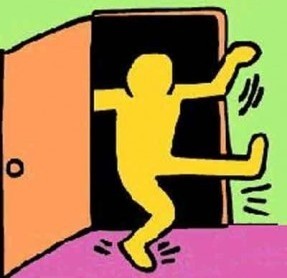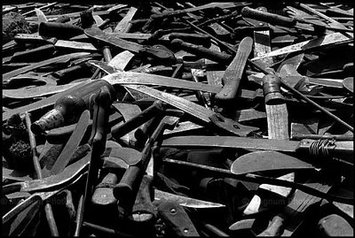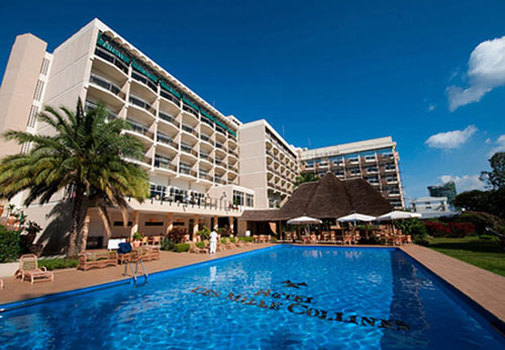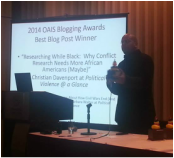
Now, because of my upbringing, very early I developed what is referred to popularly as “Gaydar” -- the ability to detect a gay man. I am not as gifted with detecting gay or bi-women, which would have been helpful while clubbing in New York City in my younger days but with a guy: give me about a minute and I'll tell you what the deal is (or not).
Now, I go into this because there are many brothers within Rwanda that are ummmmmm…. "closeted" (in the shade/shaded), in my opinion. These brothers are not "in the jungle" or "in the bush", to be clear - suggesting some crass primitivism. The logic of this position is straightforward: the continent is not the best place for homosexuals and, in my opinion, in Rwanda there is a whole country that's trying to keep the reality of gay Rwanda hidden. Indeed, I have heard and seen denial before but the degree of resistance to even the possibility of homosexuality in Rwanda during my travels there was astounding.
When asked about the idea of a gay black man in Rwanda, I was told “no, we don't have THEM here” and “no, they’re are NONE in Rwanda.” Yes, like it was the plague or something. Direct quote. Hand to the universe. On my travels, I constantly heard this. Pushed to the edge of reason and thinking about what every gay, black, male friend of mine would have said to such an assertion, I pushed and finally had one person admit that there might be at least one or two homosexuals in the whole country but that was a major admission after some alcohol. Right after my colleague said this though he added: they had better not to get caught. Seriously. Truth be told, the conversation caused my colleague to get mad at me, like I was calling him a "barbarian" or "underdeveloped" or something because of how they (he and his country) were handling their homosexuality issue. It was like he was Archie Bunker on crack with a side arm, walkie-talkie, explosive, machete (of course), a german shepherd and access to more of the same.
The evidence for the possibility of a few homosexuals in Rwanda was clear - at least to me.
First, men and women do not generally show affection to one another -- especially in the rural context. No hugging, holding of hands or kissing. Men and women however can show affection within their respective groups. Men, in particular, can and do walk hand-in-hand as well as arm in arm with each other down the road in the center of town without anyone caring. This practice was particularly problematic when Rwandans traveled abroad. For example, in America (where the last Tutsi king lives), I am told that he is often seen walking arm in arm with one of his “friends.” Of course to those in the US, it was simply assumed that they were a couple. Not that there's anything wrong with that but this is how it looked to neighbors. This was also problematic when someone I considered a friend, naturally swooped their hand to mine and started walking down the street. Now, while I agree that we were friends and appreciated the Rwandan acknowledgment of such, I still was a bit uncomfortable about what it meant in my context and what it meant to the other mizungus. This was not an issue of being homophobic (which because of my upbringing I am not). Rather, it was an issue of being seen as having “gone native” – something especially frowned upon by non-anthropologists. To have an air of legitimacy in the academia and as a researcher in the field, one had to have an air of empathy, sympathy but also a little distance. But, I digress.
My second piece of evidence for the gay Rwandan is that there was an observation of the occasional male prostitute hanging out with the female ones, eyeing the male mizungus. How did I know he was gay? Well, I mentioned my Gaydar was pretty good but, aside from this, the mascara, swishing of the hips, slicked back hair, crotch-hugging jeans and glossy lips were a big hint. Leaving with the gay white mizungu was another one. The gay mizungu was even easier to identify. Also, on this one particular occasion, there was a straight male prostitute standing right next to the gay one and the comparison was pretty simple to make. Presumably, if there's at least one gay prostitute for mizungus, there must be at least one gay man in Rwanda. Just saying.
Third, men hang out with one another all the time and are quite comfortable with one another, everywhere and at occasionally high levels of intimacy. It does make sense as far as I'm concerned that relationships would emerge. For example, men chill in saunas buck naked and real close. Men constantly rubbed oil on each other at the pool and dancing with each other at nightclubs where women would never go unless they were prostitutes. Now, I do not believe that every woman is a prostitute but mizungus are a constant draw for this type of woman and they always appeared to be wherever they congregated. In addition to that, single women never seemed to go to such places, leaving the environment all male, all the time. Now, I am also not saying that every man dancing together in a Rwandan nightclub is gay. Heck, by that category everyone dancing at Danceteria, Area and the Paladium back in New York when I grew up would be gay - which actually might be possible (except for me as well as my club buddy at the time - Parnell) and thus that is a bad example but hopefully you get my point.
The epitome of the comfort/familiarity/intimacy phenomenon of which I speak is observable by watching men occasionally sit on each others laps in a bar. Again, this in and of itself does not suggest homosexuality but the response to such familiarity and comfort did suggest homophobia, which I took as an indication that homosexuality was possible. How can you be homophobic is there is no homosexuality? See what hoops one has to go through in order to address the topic. For example, one evening I pointed out to my Rwandan host two men at some bar and asked him if sitting like that was common. To this question, it was first denied that the man was sitting on his associate’s lap - at all. This, however, was clear to everybody. There was no other place that would be as proximate to the individual's chest and groin that did not involve the lap. Now, you say: "of course, non-gay men could be sitting on each other's laps and hanging out". Well, as I mentioned, my gaydar works pretty well and I could just tell: those brothers were GAY and fabulously so! Upon acknowledging that my observation was legitimate, and this one guy was indeed sitting on his friend’s lap in a slightly gay-like manner, my Rwandan associate stood up, walked over to the host and complained. Several minutes later, there was no more lap sitting. Shortly after the initial complaint, the two gentlemen were approached by the host (who whispered something to them) and they left the bar entirely. After they left and my associate seemed to beam with a little tyrannical, homophobic pride, I wondered about whether or not and how badly I'd put the two guys at risk with my little observation. I had merely attempted to learn a bit more about Rwandan society, but quickly realized that there were just certain things that Rwandans did not want to know themselves or have visitors probe. At that point, I realized that "outing" in Africa was both possible as well as potentially dangerous.
To be honest, I found all of this completely fascinating except for the two guys being asked to leave, which I found a bit horrifying. (Note: I actually looked for them over the course of the next month to make sure that they were ok but never saw them again). The identification of Rwandan gayness as well as the denial was in large part interesting because it revealed important differences to the United States. The image of old-school, hyper-masculine aggressive youth with weapons, military fatigues, attempting to mount every female in sight still existed in the US but it is also countered by an equally open, flamboyant, bold, triumphant gayness which no one (at least not openly) would label as anything but male. One sees this in the amazing celebrations during gay pride celebrations in New York and San Francisco - perhaps some of the best parades and parties offered in America. In Rwanda, however, gay men were not even allowed as an idea, let alone reality. There are no parades there but only charades. On this dimension (and perhaps a few others), the country wears the mask that grins and lies. Indeed, the strength with which they were denied their existence was perhaps as indicative of the tenuousness of control over the society as the openly, hyper masculine aggressive young men with weapons and military fatigues attempting to mount every female in sight which was not only clearly observable in Rwanda but largely celebrated. Just as I could not imagine an America without its fabulous gayness, I could not imagine a Rwanda with one.



 RSS Feed
RSS Feed
